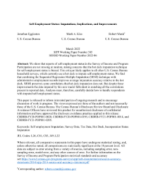Self-Employment Status: Imputations, Implications, and Improvements
Self-Employment Status: Imputations, Implications, and Improvements
Introduction
We show that reports of self-employment status in the Survey of Income and Program Participation are not missing at random, raising concerns that the hot deck imputation technique for self-employment status is biased. This critique likely applies to all other U.S. Census Bureau household surveys, which currently use a hot deck to impute self-employment status. We find that combining the Sequential Regression Multiple Imputation (SRMI) technique with administrative employment records improves average imputation accuracy relative to the hot deck. SRMI preserves some correlations that hot deck imputation does not. But despite these improvements the data imputed by this new model falls short in matching all the correlations present in reported data. Analysts must, therefore, carefully decide how to handle respondents with imputed self-employment status.




